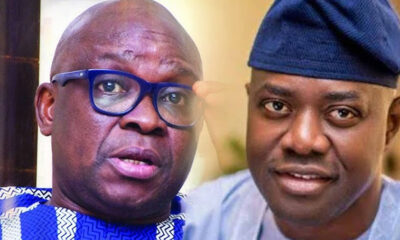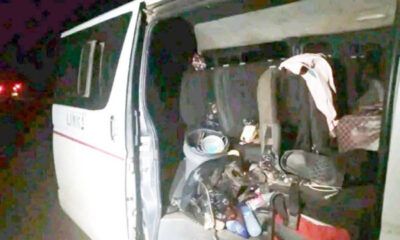Business
CBN governor, bank chiefs on a collision course over amount of new notes

The cash crunch that hit most banks in the country since Monday, January 30, 2023 continued yesterday as banks said they had not been getting enough cash from the Central Bank of Nigeria (CBN) to disburse to their customers.
Consequently, the Association Senior Staff of Banks Insurance and Financial Institutions (ASSBIFI) has challenged the Central Bank of Nigeria (CBN) to make public how much new naira notes it had pushed into circulation, even as it expressed worry over the scarcity of new and old naira notes in the country.
The president of ASSBIFI, Comrade Olusoji Oluwole, lamented that Nigerians are going through excruciating difficulties in order to feed and do business transactions because of the cash crunch brought by the policy. He called for a review of the policy in order to save Nigerians from further hardship.
Oluwole urged the CBN to publicly declare how much of the new Naira notes has been printed and distributed so far to banks for disbursement compared with what has been withdrawn from the public.
The ASSBIFI helmsman disclosed that its independent study showed that the volume of the new notes in circulation is highly insufficient and most of the Automated Teller Machines (ATMs) have no new notes to dispense, while some of those dispensing are still paying out old notes.
“Nigerians have been reduced to moving from one ATM point to another in search of new Naira notes that should have been abundantly supplied. Pressure has been on bank workers who interface with the angry public in the process of depositing old or withdrawing the new notes, and we request urgent actions by the CBN to avoid attacks and other unruly actions against these bank workers as their safety and health are of great concern to the union to us in ASSBIFI,” Oluwole said.
A banker who craved anonymity said addressing the scarcity of cash is something that only the CBN can do, even as he said there ought to be discussions between the CBN and the committee of bank chief executives on how to address the ongoing scenario.
“The CBN should know what our requirements are, they should know what we require and how much will serve our customers. A bank that has over 300 branches and the CBN is giving them only N350 million; that means N1 million per branch. How do we deal with this?
The cash crunch that hit most banks in the country since Monday, January 30, 2023 continued yesterday as banks said they have not been getting enough cash from the Central Bank of Nigeria (CBN) to disburse to their customers.
Consequently, the Association Senior Staff of Banks Insurance and Financial Institutions (ASSBIFI) has challenged the Central Bank of Nigeria (CBN) to make public how much new Naira notes it had pushed into circulation, even as it expressed worry over the scarcity of new and old Naira notes in the country.
The president of ASSBIFI, Comrade Olusoji Oluwole, lamented that Nigerians are going through excruciating difficulties in order to feed and do business transactions because of the cash crunch brought by the policy. He called for a review of the policy in order to save Nigerians from further hardship.
Oluwole urged the CBN to publicly declare how much of the new Naira notes has been printed and distributed so far to banks for disbursement compared with what has been withdrawn from the public.
The ASSBIFI helmsman disclosed that its independent study showed that the volume of the new notes in circulation is highly insufficient and most of the Automated Teller Machines (ATMs) have no new notes to dispense, while some of those dispensing are still paying out old notes.
“Nigerians have been reduced to moving from one ATM point to another in search of new Naira notes that should have been abundantly supplied. Pressure has been on bank workers who interface with the angry public in the process of depositing old or withdrawing the new notes, and we request urgent actions by the CBN to avoid attacks and other unruly actions against these bank workers as their safety and health are of great concern to the union to us in ASSBIFI,” Oluwole said.
A banker who craved anonymity said addressing the scarcity of cash is something that only the CBN can do, even as he said there ought to be discussions between the CBN and the committee of bank chief executives on how to address the ongoing scenario.
“The CBN should know what our requirements are, they should know what we require and how much will serve our customers. A bank that has over 300 branches and the CBN is giving them only N350 million; that means N1 million per branch. How do we deal with this?
“We can’t even pay with the old note and we don’t have the new notes. The new trend is that, because banks don’t want to get in trouble, they are paying customers in N100 and N20 notes. And that is because they don’t want more problems. Customers are protesting that they want their money and since the lower denominations are still legal tender, banks are paying with them.
“There is a shortage of cash everywhere. We did not envisage what is happening now. The only place where a solution can come is from CBN. The CBN should release more cash, and at the CEO level, there should be engagements with CBN on this,” the banker stated.
The president, Nigeria Labour Congress (NLC), Comrade Ayuba Wabba, has attributed the current scarcity of old/new Naira notes coupled with fuel scarcity and hike in pump prices to systemic failure and corruption.
Speaking in an exclusive interview with LEADERSHIP in Lagos yesterday, Wabba said: “Millions of man-hours are lost with many people now rendered unproductive by scarcity of old, new Naira notes while people now spend hours on queue for fuel in a society blessed with abundant human and natural resources.
“The unbanked people living in rural areas and marketers are feeling the pain more as they don’t have any other means of survival. There are no old and new maira notes for people to transact business. Why the haste in implementation of Naira redesign which could have been allowed to flow side by side for months before old notes are eventually mopped up.”
Nationwide, bank tellers have been turning customers away as they say there is no cash to pay them, and queues at the few Automated Teller Machines (ATMs) that are paying cash are growing longer.
Ngozi, a trader who sells electrical materials alongside her husband in Lagos said she is already running low on cash and does not know if she will be able to open her shop by the end of the week if the cash crunch continues.
“All the people that have been patronising my shop have been doing transfers which even misbehaves. I went to the bank to collect cash so that we can have money to run around and I was told that I can only get N2000. I have money in the bank and I can’t take it. It is very frustrating,” she said.
The cash crunch that hit most banks in the country since Monday, January 30, 2023 continued yesterday as banks said they have not been getting enough cash from the Central Bank of Nigeria (CBN) to disburse to their customers.
Consequently, the Association Senior Staff of Banks Insurance and Financial Institutions (ASSBIFI) has challenged the Central Bank of Nigeria (CBN) to make public how much new Naira notes it had pushed into circulation, even as it expressed worry over the scarcity of new and old Naira notes in the country.
The president of ASSBIFI, Comrade Olusoji Oluwole, lamented that Nigerians are going through excruciating difficulties in order to feed and do business transactions because of the cash crunch brought by the policy. He called for a review of the policy in order to save Nigerians from further hardship.
Oluwole urged the CBN to publicly declare how much of the new Naira notes has been printed and distributed so far to banks for disbursement compared with what has been withdrawn from the public.
The ASSBIFI helmsman disclosed that its independent study showed that the volume of the new notes in circulation is highly insufficient and most of the Automated Teller Machines (ATMs) have no new notes to dispense, while some of those dispensing are still paying out old notes.
“Nigerians have been reduced to moving from one ATM point to another in search of new Naira notes that should have been abundantly supplied. Pressure has been on bank workers who interface with the angry public in the process of depositing old or withdrawing the new notes, and we request urgent actions by the CBN to avoid attacks and other unruly actions against these bank workers as their safety and health are of great concern to the union to us in ASSBIFI,” Oluwole said.
A banker who craved anonymity said addressing the scarcity of cash is something that only the CBN can do, even as he said there ought to be discussions between the CBN and the committee of bank chief executives on how to address the ongoing scenario.
“The CBN should know what our requirements are, they should know what we require and how much will serve our customers. A bank that has over 300 branches and the CBN is giving them only N350 million; that means N1 million per branch. How do we deal with this?
“We can’t even pay with the old note and we don’t have the new notes. The new trend is that, because banks don’t want to get in trouble, they are paying customers in N100 and N20 notes. And that is because they don’t want more problems. Customers are protesting that they want their money and since the lower denominations are still legal tender, banks are paying with them.
“There is a shortage of cash everywhere. We did not envisage what is happening now. The only place where a solution can come is from CBN. The CBN should release more cash, and at the CEO level, there should be engagements with CBN on this,” the banker stated.
The president, Nigeria Labour Congress (NLC), Comrade Ayuba Wabba, has attributed the current scarcity of old/new Naira notes coupled with fuel scarcity and hike in pump prices to systemic failure and corruption.
Speaking in an exclusive interview with LEADERSHIP in Lagos yesterday, Wabba said: “Millions of man-hours are lost with many people now rendered unproductive by scarcity of old, new Naira notes while people now spend hours on queue for fuel in a society blessed with abundant human and natural resources.
“The unbanked people living in rural areas and marketers are feeling the pain more as they don’t have any other means of survival. There are no old and new maira notes for people to transact business. Why the haste in implementation of Naira redesign which could have been allowed to flow side by side for months before old notes are eventually mopped up.”
Nationwide, bank tellers have been turning customers away as they say there is no cash to pay them, and queues at the few Automated Teller Machines (ATMs) that are paying cash are growing longer.
Ngozi, a trader who sells electrical materials alongside her husband in Lagos said she is already running low on cash and does not know if she will be able to open her shop by the end of the week if the cash crunch continues.
“All the people that have been patronising my shop have been doing transfers which even misbehaves. I went to the bank to collect cash so that we can have money to run around and I was told that I can only get N2000. I have money in the bank and I can’t take it. It is very frustrating,” she said.
A roadside fruit seller said all her regular customers have been paying her with transfers and the few who are paying cash have paid with the new notes.
“All the transfers that my customers did yesterday, I am yet to get the alert but since they are my regulars, I am not so worried. This scarcity of cash has to end soon”, she said.
A business woman in Lagos, Mrs Kome Enobong, told LEADERSHIP that she left her home as early as 7am to her bank to withdraw some of the funds in her account, only to be told that there is no money to give to her.
“I have visited three Union Bank branches, but I couldn’t withdraw my money. I was told that there is no money in the bank to give to me. This is my money that I have worked for. The ATMs are not dispensing cash either. How am I going to feed my children, because right now, I don’t even have money on me?,” Mrs Enobong lamented.
A teacher, Mr James Niyi who also shared his ordeal with LEADERSHIP, said, “I cannot withdraw my own hard earned money from my bank. I had to use POS, where I spent N1,000 to get N10,000. This is really pathetic,” Niyi said, calling on CBN to intervene.
A POS operator, Mr Okanlawon noted that, they have not been able to do business as usual as there is no cash to give to customers who continue to throng his shop in search of cash. “My customers have been begging me for cash but what can I do if I don’t have the cash to give them? If this continues, I hope that people don’t take to the streets to riot over scarcity of cash.”
As of yesterday, some POS operators were charging N1,500 for N10,000 withdrawals while some were charging N1,000.
Mrs Akin, a civil servant, said after lots of begging and shouting in the bank, she was able to get N5,000, paid in N5 notes.
LEADERSHIP had, on Tuesday, reported that business activities were paralysed in Lagos State as bank customers queued for long hours at Automated Teller Machine (ATM) terminals across Lagos State to withdraw cash.
Similarly, electronic banking transfer through the mobile app, or USSD code, as well as Point of Sales (POS) machines network were extremely poor as people could not pay for services rendered through the electronic banking system.
Leadership
Aviation
VAT on Aircraft, Spare Parts Threatens Survival of Nigerian Airlines, says Allen Onyema

VAT on Aircraft, Spare Parts Threatens Survival of Nigerian Airlines, says Allen Onyema
The Air Peace CEO, Allen Onyema, has warned that Nigeria’s new tax laws threaten the survival of local airlines, arguing that the legislation reinstates taxes removed under the 2020 reforms. The taxes include customs duties on imported aircraft, aircraft parts, engines, and Value Added Tax (VAT) on tickets, which Onyema says will impose unsustainable financial burdens on airlines.
Speaking in an interview with Arise News on Sunday, Onyema stressed the high cost implications for airline operators.
“There is VAT on the importation of aircraft. For an aircraft worth $80 million, you are supposed to pay 7.5 percent. With bank loan interest rates at 30–35 percent, plus VAT on spare parts, it is unsustainable,” Onyema said. “If we implement that tax reform, Nigerian airlines will go down in three months.”
The Air Peace CEO also announced that the airline industry will no longer tolerate unruly passengers starting January 1, 2026. Onyema cited instances of disruptive behaviour by passengers on flights, including smuggling alcohol into the cabin, forcing upgrades to business class without payment, and threatening fellow travellers.
READ ALSO:
- Train Derailment in Southern Mexico Kills 13, Injures Nearly 100 in Oaxaca
- Tragedy in Lekki as Lexus SUV Crashes Into Children, One Feared Dead, Four Injured
- Presidency Intervenes in Akume, Alia Political Dispute in Benue
He referenced a recent incident on a flight diverted to Manchester, UK, due to bad weather, where passengers staged a viral video accusing Air Peace of misconduct, despite British authorities confirming that over 200 flights were diverted that day.
Onyema emphasised that airlines will now enforce stricter measures, including blacklisting unruly passengers, asserting that the behaviour is currently being “supported by the system unnecessarily.”
The statement comes amid growing concerns over rising domestic airfares. On December 10, the Senate summoned the Aviation Minister, Festus Keyamo, and industry stakeholders over soaring ticket prices. Subsequently, on December 11, the House of Representatives called on the federal government to reduce aviation taxes by 50 percent to ease costs for travellers.
Onyema’s comments highlight both the financial pressures on Nigerian airlines due to aviation taxes and the sector’s new stance on passenger discipline to safeguard safety and service standards.
VAT on Aircraft, Spare Parts Threatens Survival of Nigerian Airlines, says Allen Onyema
Auto
Changan CS55, Kia Seltos take top SUV honours at 2025 NAJA Auto Awards

Changan CS55, Kia Seltos take top SUV honours at 2025 NAJA Auto Awards
Changan CS55 and Kia Seltos have clinched top honours at the 2025 Nigeria Auto Journalists Association (NAJA) International Auto Awards, winning Midsize SUV of the Year and Compact SUV of the Year, respectively.
The awards were announced at a recent well-attended ceremony held at the Oriental Hotel, Victoria Island, Lagos, which brought together key stakeholders across Nigeria’s automotive value chain to celebrate excellence, resilience and innovation in the industry.
Changan CS55’s latest recognition comes after its impressive performance at last year’s 17th edition of the awards, where it was crowned Nigeria’s New Car of the Year.
At the 2025 ceremony, the compact crossover SUV edged out strong contenders such as the Kia Sonet and Chery Tiggo to secure the coveted Midsize SUV title.
Changan vehicles are marketed and assembled in Nigeria by Mikano Motors, reinforcing the growing impact of local assembly in the country’s automotive sector.
In the Compact SUV category, the Kia Seltos emerged winner, beating notable competitors such as the Toyota Prado, Changan CS55 and Chery Tiggo.
READ ALSO:
- Ojuelegba Bridge Gridlock as Container Truck Overturns in Surulere, Lagos
- Troops Foil Kidnapping on Otukpo–Enugu Expressway, Rescue Passengers in Benue
- Davido Joins Accord Party, Aligns With Uncle, Osun Governor Ademola Adeleke
Industry analysts have described the Seltos as a compelling blend of practicality and style, praising its bold design, versatility and appeal to modern drivers.
Other corporate winners at the event are the Mikano Group, which was named Auto Company of the Year; Iron Products Industries (IPI) Limited, honoured as Truck Assembler/Body Builder of the Year; Lanre Shittu Motors (JAC), awarded Truck Plant of the Year; and Innoson Vehicle Manufacturing (IVM), which won Passenger Car Assembly Plant of the Year.
These recognitions highlighted the depth and growing strength of indigenous participation in Nigeria’s automotive industry.
Speaking at the ceremony, the Director-General of the National Automotive Design and Development Council (NADDC), Otunba Joseph Osanipin, commended NAJA for sustaining a credible platform promoting excellence and accountability within the sector.
In his welcome address, NAJA Chairman Mr Theodore Opara described the awards as a benchmark for performance in Nigeria’s evolving automotive ecosystem, noting that the industry continues to adapt amid policy reforms, technological advancements and changing consumer expectations.
The 2025 NAJA International Auto Awards once again underscored the critical role of leading brands in strengthening Nigeria’s transportation and industrial backbone, while celebrating outstanding achievements across the nation’s automotive landscape.
Changan CS55, Kia Seltos take top SUV honours at 2025 NAJA Auto Awards
Railway
Excited passengers hail FG as 50% yuletide train fare cut sparks nationwide rush

Excited passengers hail FG as 50% yuletide train fare cut sparks nationwide rush
Excitement swept through major railway stations across the country on Tuesday and Wednesday as thousands of passengers turned out to enjoy the Federal Government’s 50 percent yuletide train fare reduction, with many openly praising the initiative as a major relief amid rising transport costs.
From the Lagos–Ibadan and Abuja–Kaduna standard gauge corridors to key narrow gauge routes, passengers arrived early, smiling, cheering and expressing gratitude to the government for what they described as a “timely Christmas gift.”
Several train services departed with near-full capacity as Nigerians seized the opportunity to travel cheaply to reunite with family and loved ones for the Christmas and New Year celebrations.
The discounted festive rail service, approved by the Federal Government and implemented by the Nigerian Railway Corporation (NRC), runs from Tuesday, December 23, 2025, to Sunday, January 4, 2026, offering passengers a 50 percent reduction on fares nationwide.
Speaking at various stations, passengers said the fare cut had significantly eased the financial burden of holiday travel, especially for families and group travellers.
Many described the initiative as people-centred and compassionate, noting that it allowed them to travel safely and comfortably at a time when road transport costs have surged.
“I never imagined I would travel this cheap during Christmas,” a passenger at the Lagos terminus said. “This is a big relief. The government has really tried, and we are grateful.”
Confirming the successful commencement of the programme, the NRC Chief Public Relations Officer, Callistus Unyimadu, said the turnout across major routes showed strong public acceptance of the initiative, adding that early bookings reflected overwhelming passenger interest.
The Managing Director and Chief Executive Officer of the NRC, Dr Kayode Opeifa, assured passengers that the corporation was fully prepared to sustain safe, efficient and customer-friendly services throughout the festive period.
He said enhanced security, safety and customer service measures had been put in place across stations and onboard trains to manage the increased traffic resulting from the fare reduction.
The NRC noted that both standard gauge and narrow gauge services are fully operational, advising passengers on standard gauge routes to continue using NRC-approved online booking platforms, while narrow gauge passengers can purchase tickets directly at designated railway stations.
The 50 percent yuletide train fare cut is part of the Renewed Hope Agenda of President Bola Ahmed Tinubu, aimed at reducing transportation costs, promoting inclusive mobility and encouraging rail transport as a safer and more reliable option during peak travel seasons.
As the festive rush continues, the NRC urged passengers to cooperate with railway officials and comply with travel guidelines to ensure smooth and hitch-free journeys throughout the discount period.
If you want, I can make it more emotional, more political, or more populist depending on the platform (Vanguard, Punch-style, or government-leaning tone).
-

 Entertainment3 days ago
Entertainment3 days agoBreaking: Popular Nigerian Actress Allwell Ademola Dies at 43
-

 metro2 days ago
metro2 days agoIbadan Explosion: Fayose Releases Documents, Claims Makinde Got ₦50bn from FG
-

 metro2 days ago
metro2 days agoPlateau Kidnappers Demand ₦1.5m Each as 28 Muslim Travellers Remain in Captivity
-

 Sports1 day ago
Sports1 day agoCristiano Ronaldo Wins Best Middle East Player at 2025 Globe Soccer Awards in Dubai
-

 metro1 day ago
metro1 day agoNiger Delta Crackdown: Army Seizes ₦150m Stolen Oil, Arrests 19 Suspects
-

 Opinion2 days ago
Opinion2 days agoHow a Misleading Channels TV Headline Reignited Nigeria’s Religious Tensions
-

 Sports1 day ago
Sports1 day agoAnthony Joshua injured as two die in fatal Lagos-Ibadan Expressway crash (plus photos)
-

 metro2 days ago
metro2 days agoNigerian Army Kills 438 Boko Haram, ISWAP Terrorists in Seven Months











